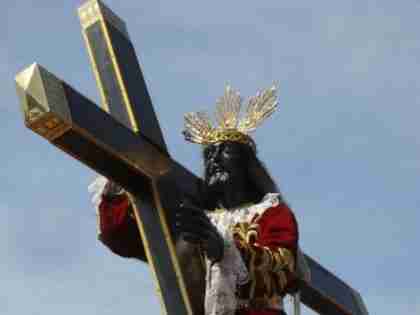This morning’s key headlines from GenerationalDynamics.com.
- Nine million to celebrate the Black Nazarene Feast on Monday in Philippines
- Instability in Xinjiang causes China to threaten Pakistan
- Will Yemen’s President Saleh get away with it again?
- Russia’s warships visit Syria’s port of Tartus
Nine million to celebrate the Black Nazarene Feast on Monday in Philippines
|
|
 |
|
|
Philippines President Benigno Aquino III advised the nearly nine million devotees joining the Black Nazarene Feast on Monday to be vigilant as the government received reports of possible terror threats, and he announced increased security precautions at the Quiapo Church in Manila. The Black Nazarene is the patron saint of Quiapo. The life-size image of the Black Nazarene shows a “black” Jesus Christ carrying a cross. The statue was brought to Manila by a Spanish priest in 1607. It was aboard a ship that caught fire, the image was burned, and it came to be known as the “Black Nazarene.” Sun Star (Manila)
Instability in Xinjiang causes China to threaten Pakistan
Under pressure from the al-Qaeda linked Turkestani Islamic Party (TIP), which has conducted numerous terrorist attacks in Xinjiang province, China is putting increasing pressure on Pakistan to control the militants in the Federally Administered Tribal Areas (FATA), where TIP terrorists are being trained by al-Qaeda, or to allow China to set up military bases in Pakistan. TIP’s attacks on Xinjiang threaten China’s core interests in several ways:
- Instability in Xinjiang is a threat to Chinese Communist Party (CCP) credibility and legitimacy.
- Separatist movements in Xinjiang encourage similar movements in other regions, including Tibet, Inner Mongolia and Taiwan. A sign of weakness in Xinjiang will be interpreted badly by “splittist” groups in these other regions.
- Xinjiang is a strategic region for China. Three times the size of France and one sixth of China’s land area, it share borders with eight countries: Mongolia, Russia, Kazakhstan, Kyrgyzstan, Tajikistan, Afghanistan, Pakistan and India. It is rich in energy resources and a key transport corridor for China to access energy and strategic minerals from Central Asia, Caspian region and the Middle East.
- TIP terrorist attacks threaten a core tenet of China’s strategy of stabilizing Xinjiang–as an ‘inseparable part of China,” for resource extraction and as a springboard into Central Eurasia. Xinjiang is a vital section of the continental rail route, the Eurasia Land Bridge, which connects China with Europe.
- One rarely mentioned aspect of Xinjiang is that it hosts China’s nuclear test site Lop Nur. Persistent unrest has left China’s Xinjiang-based nuclear warheads vulnerable, and large scale unrest might make these weapons become vulnerable to seizure by Uighur militant groups.
TIP is targeting not only Xinjiang but also Chinese citizens and projects in Pakistan itself. The situation is becoming increasingly unsustainable, leading China to diverge from its long-stated policy of “non-intervention” in the affairs of other countries, and to keep PLA (People’s Liberation Army) troops in other countries to protect Chinese interests, something they’ve criticized the U.S. for doing for decades. They’ve already violated that principle by deploying 300 armed police to the the lawless triple-border area of the Golden Triangle (Laos, Thailand and Burma) in a joint patrol, following the murders of Chinese workers on the Mekong River. China may now go even further by deploying PLA soldiers to both Pakistan and Afghanistan to keep the TIP terrorists under control. Jamestown
Will Yemen’s President Saleh get away with it again?
|
|
 |
|
|
A bitter split has developed between Yemen’s president Ali Abdullah Saleh and Vice President Abdu Rabu Hadi at a time when “Arab Spring” riots and demonstrations have been continuing. Demonstrators have been demanding that Saleh step down, and the Saudi-led Gulf Cooperation Council (GCC) drew up a plan for him to do so. Several times, Saleh said he’d sign the plan, but then at the last minute he refused each time. Finally, in November, he signed the GCC plan, agreeing to step down on February 15, and turn power over to Hadi. But now it appears it’s just another stalling maneuver, and Saleh has no intention of stepping down. Saleh is furious with Hadi’s actions in recent months, including his steadily decreasing the powers of the president and his most ardent loyalists under the terms of the GCC deal. The Saleh-Hadi rifts adds a major new element of instability to a country that the west fears is close to becoming completely unstable. Al-Qaeda on the Arabian Peninsula (AQAP) is headquartered in Yemen, and it’s feared that an unstable Yemen will allow an al-Qaeda takeover. CNN
Russia’s warships visit Syria’s port of Tartus
Syria’s authorities are calling the visit of a Russian naval task force, led by the Admiral Kuznetsov aircraft carrier, to the port of Tartus a “show of solidarity with the Syrian people.” It was just six weeks ago that Russian military officials specifically denied that the Kuznetsov would be visiting the port of Tartus. Ria Novosti and Ria Novosti (11/29)
COMMENTS
Please let us know if you're having issues with commenting.